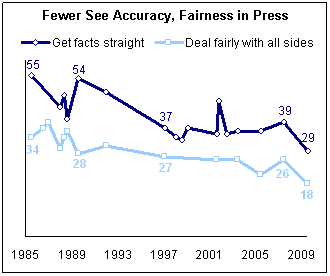 In my BtoB magazine column earlier this year, I suggested that office-supply giant Staples should take advantage of the collapse of mainstream publishing industry to become a trusted media source for small business. Staples hasn’t yet taken the plunge, but a number of other brands have, and I think it’s worth looking at the trend.
In my BtoB magazine column earlier this year, I suggested that office-supply giant Staples should take advantage of the collapse of mainstream publishing industry to become a trusted media source for small business. Staples hasn’t yet taken the plunge, but a number of other brands have, and I think it’s worth looking at the trend.
Here’s the premise: Mainstream media is collapsing. This is creating what I call a “trust gap” in the market. Not only are the institutions themselves disappearing but trust in mainstream media at a 20-year low (see Pew Research chart at right). Social networks can fill some of the void, but not all of it. There is room in the market for new trusted sources to emerge and there is no reason why businesses and institutions, using the tools of new media, can’t step in.
Early Adopters
Let’s look at a few examples of what big brands are doing in this area:
- Bank of America is targeting small businesses with its Small Business Online Community. This operation is heavy on user-generated content, the idea being that small business owners are eager to help each other. Judging by the amount of activity, the site is doing pretty well. Most articles that are more than six months old have several thousand page views. Top contributors are rewarded with a points system that elevates their standing in the community. This is an effective incentive.
- Not to be outdone, American Express is also going after small businesses with Open Forum. Amex is taking a different approach from Bank of America by relying more heavily on assigned articles from professional writers and business innovators and less on community contributions, although there is room for user generated content. The editors have spotlighted a few frequent contributors and designated them as experts. There’s also a service that helps visitors find small businesses by specialty. That’s a nice incentive to get their target audience involved. Finally, there’s an impressive collection of videos of successful small-business owners who are, naturally, also Amex cardholders.
- Office Depot covets small businesses, too (see a pattern here?). However, it’s taken an entirely different approach with a Survival of the Smartest, a website that features consumer promotions, contests and discounts. The initiative is an experimental alternative to the hundreds of millions of dollars the retailer spends on circulars Sunday newspaper circulars, according to a recent article in MediaPost. Two video hosts provide an umbrella of entertainment and coupons and promotions help close the deal. There’s also a desktop widget that alerts visitors to new specials.
 One interesting initiative that has flown under my radar for some time is Barnes & Noble Review. This elegant looking site has published more than 1,200 book reviews over the last two years and also features columnists and author interviews. It’s a beautiful sight, which I’m sure is no accident. Its design is reminiscent of the Sunday book review sections that have been hacked out of many daily newspapers over the last two years.
One interesting initiative that has flown under my radar for some time is Barnes & Noble Review. This elegant looking site has published more than 1,200 book reviews over the last two years and also features columnists and author interviews. It’s a beautiful sight, which I’m sure is no accident. Its design is reminiscent of the Sunday book review sections that have been hacked out of many daily newspapers over the last two years.- Perhaps the most direct attack on the traditional media space and I’ve seen this year comes from PepsiCo, which hired a group of bloggers and video podcasters to report on the Internet Week conference last June. In a BrandWeek interview last spring, entitled “Pepsi Sees a Chance to Fill Newspapers’ Void,” Pepsi social media guru Bonin Bough said the soft drink maker saw opportunity in the demise of traditional media. Pepsi was openly advertising jobs for unemployed journalists and journalism students prior to Internet Week.
I think this is the tip of the iceberg. Once big brands get over their addiction to increasingly ineffective conventional marketing channels and take advantage of the chance to build new audiences, they will flock to these new opportunities. Advertising is one of the most expensive ways to build customer affinity. In contrast, trusted media brands enjoy customer loyalty that extends for decades. Why would you not want to get a piece of that?

great blog post. i am still reading your books. taking my time … they are juicy.
You are definitely on to something.